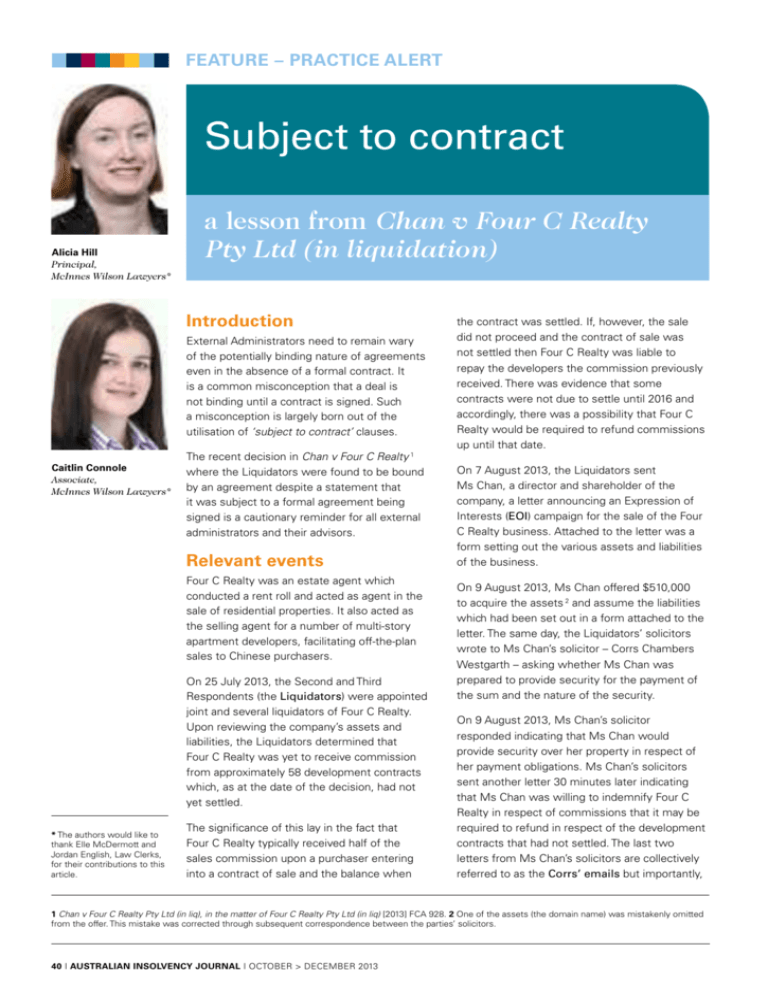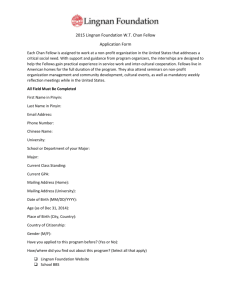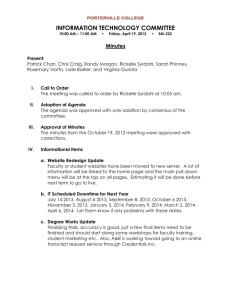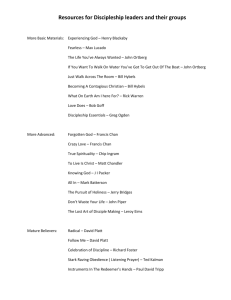Subject to contract: a lesson from Chan v Four C Realty Pty Ltd
advertisement

feature – practice alert Subject to contract Alicia Hill Principal, McInnes Wilson Lawyers* a lesson from Chan v Four C Realty Pty Ltd (in liquidation) Introduction External Administrators need to remain wary of the potentially binding nature of agreements even in the absence of a formal contract. It is a common misconception that a deal is not binding until a contract is signed. Such a misconception is largely born out of the utilisation of ‘subject to contract’ clauses. Caitlin Connole Associate, McInnes Wilson Lawyers* The recent decision in Chan v Four C Realty 1 where the Liquidators were found to be bound by an agreement despite a statement that it was subject to a formal agreement being signed is a cautionary reminder for all external administrators and their advisors. Relevant events Four C Realty was an estate agent which conducted a rent roll and acted as agent in the sale of residential properties. It also acted as the selling agent for a number of multi-story apartment developers, facilitating off-the-plan sales to Chinese purchasers. On 25 July 2013, the Second and Third Respondents (the Liquidators) were appointed joint and several liquidators of Four C Realty. Upon reviewing the company’s assets and liabilities, the Liquidators determined that Four C Realty was yet to receive commission from approximately 58 development contracts which, as at the date of the decision, had not yet settled. * The authors would like to thank Elle McDermott and Jordan English, Law Clerks, for their contributions to this article. The significance of this lay in the fact that Four C Realty typically received half of the sales commission upon a purchaser entering into a contract of sale and the balance when the contract was settled. If, however, the sale did not proceed and the contract of sale was not settled then Four C Realty was liable to repay the developers the commission previously received. There was evidence that some contracts were not due to settle until 2016 and accordingly, there was a possibility that Four C Realty would be required to refund commissions up until that date. On 7 August 2013, the Liquidators sent Ms Chan, a director and shareholder of the company, a letter announcing an Expression of Interests (EOI) campaign for the sale of the Four C Realty business. Attached to the letter was a form setting out the various assets and liabilities of the business. On 9 August 2013, Ms Chan offered $510,000 to acquire the assets 2 and assume the liabilities which had been set out in a form attached to the letter. The same day, the Liquidators’ solicitors wrote to Ms Chan’s solicitor – Corrs Chambers Westgarth – asking whether Ms Chan was prepared to provide security for the payment of the sum and the nature of the security. On 9 August 2013, Ms Chan’s solicitor responded indicating that Ms Chan would provide security over her property in respect of her payment obligations. Ms Chan’s solicitors sent another letter 30 minutes later indicating that Ms Chan was willing to indemnify Four C Realty in respect of commissions that it may be required to refund in respect of the development contracts that had not settled. The last two letters from Ms Chan’s solicitors are collectively referred to as the Corrs’ emails but importantly, 1 Chan v Four C Realty Pty Ltd (in liq), in the matter of Four C Realty Pty Ltd (in liq) [2013] FCA 928. 2 One of the assets (the domain name) was mistakenly omitted from the offer. This mistake was corrected through subsequent correspondence between the parties’ solicitors. 40 I australian insolvency journal I october > december 2013 feature I Subject to contract – a lesson from Chan v Four C Realty Pty Ltd (in liquidation) > 2 the later Corr’s email did not refer to the earlier Corrs’ email. On 13 August 2013, after subsequent correspondence between the parties’ solicitors, the Liquidators wrote to Ms Chan purporting to accept her offer. The letter reiterated the terms of the agreement and relevantly stated: ‘You have agreed to provide security over your property at 477 Waverley Road, Malvern East in respect of your payment obligations. … The Liquidators acceptance of your offer constitutes a binding and enforceable agreement. However, it is intended that these terms be more fully engrossed in a formal sale agreement.’ On that same day, Ms Chan paid $300,000 to the liquidators. By 30 August 2013 Ms Chan had deposited the remaining $210,000. The Liquidators later contended that the term requiring security ‘in respect of your payment obligations’ extended to Ms Chan being required to provide security for the indemnity in respect of refunds that may be due in respect of development contracts that are yet to settle. Ms Chan sought to carry out the contract on the express terms of the correspondence of 13 August 2013, namely by only providing security in respect of her payment obligations and not in respect of ‘the indemnity’. Ms Chan applied to the Federal Court under ss 471B, 477(2B) and 477(6) of the Corporations Act 2001 (Cth) for a series of orders, including a declaration that Four C Realty had entered into a binding and enforceable contract for her to purchase the business assets of the company. The Liquidators argued that no binding contract existed and alternatively, if it did exist, then it was a term of the contract that Ms Chan was required to provide security for ‘the indemnity’. Decision The Court was required to consider and determine two questions: 1 was there a binding agreement between Ms Chan and the Respondent Liquidators? 2 if so, what were the terms of the agreement? Reconstruction & Insolvency We are leaders in the field. Our Restructuring, Insolvency and Forensic Group members have been involved in matters of all sizes and types. Each member has a unique commitment and focus in this highly specialised area. As such they have developed a formidable reputation. They provide tailored expertise for clients seeking to proactively manage risk, develop restructuring strategies, produce work-out proposals and litigate claims. Our experts are known for their ability to bring a strong, focused and commercially strategic mindset to every situation. They are innovative and committed advocates of each clients’ interests. Their depth of knowledge and commitment at all levels is second to none. For assistance contact our team on 1300 MCKAYS Paul Evans Paul Agnew W www.mckayslaw.com E insolvency@mckayslaw.com Brisbane | Mackay | Gold Coast | Surat Basin Reconstruction & Involvency.indd 1 05/07/2013 3:00:59 PM australian insolvency journal I october > december 2013 I 41 feature I Subject to contract – a lesson from Chan v Four C Realty Pty Ltd (in liquidation) > 3 Was there a binding agreement between Ms Chan and the Respondent Liquidators? The Court found that agreement was reached on 13 August 2013 noting the following reasons: ◗ the opening paragraph in the Liquidator’s letter on 13 August noted that the Liquidators were responding to the EOI lodged by Ms Chan and the Corrs’ emails; ◗ Ms Chan’s EOI and the Corrs’ emails constituted an offer capable of acceptance, as evidenced by the Liquidators stating that the offer constituted a ‘binding and enforceable agreement’ but that the terms would be ‘more fully engrossed in a formal sale agreement;’ ◗ the Liquidators had confirmed acceptance of the price offered of $510,000 on certain terms and conditions as noted in the 13 August 2013 letter. Furthermore, the Court noted that there was no lack of any essential term which would see the agreement fail for a lack of completeness.3 The Court found that, viewed objectively,4 the case fell within the first class identified in the High Court decision in Masters v Cameron.5 That is, the parties intended to be immediately bound to the performance of the terms of their bargain but proposed to have the terms restated in a form which would be fuller or more precise but not different in effect. This constituted a contract binding on the parties at once to perform the agreed terms whether the contemplated formal documents came into existence or not. The Liquidators had argued that the 13 August letter was a counter-offer, rejecting the original offer and therefore preventing it from being capable of acceptance. The Court rejected that argument concluding that the existence, timing and content of the emails (set out above) were all inconsistent with that submission. The 13 August letter had described the Corrs’ emails and the EOI as the ‘offer’ which the Liquidators accepted. The Liquidators had argued that no binding contract existed on 13 August 2013 because correspondence between the parties after this date demonstrated that the parties ‘continued to explore the breadth of the offer’. This argument was similarly rejected, the Court finding that the letters after this date did no more than indicate that Ms Chan remained ready, willing and able to comply with the terms of the ‘Contract.’ What were the terms of the agreement? The terms of the agreement were found to have been clearly set out in the 13 August 2013 letter. However the Liquidators referred to the following two paragraphs in the letter to submit that a term of the contract also extended to Ms Chan being required to provide security for the indemnity referred to in the Corrs’ emails: ‘You have agreed to provide security over your property at 477 Waverley Road, Malvern East in respect of your payment obligations. Further, you have agreed to indemnify [Four C Realty] in respect of any commission which [Four C Realty] is required to refund in respect of development contracts that are yet to settle.’ Justice Gordon rejected this submission finding that it was contrary to the express words of the 13 August 2013 letter which was the acceptance of the earlier offer recorded in the EOI and the Corrs’ emails. Viewed objectively, the term of the contract by which Ms Chan agreed to provide security was separate, and independent, of the term of the contract by which Ms Chan agreed to provide the indemnity. The two Corrs’ emails did not connect the two issues in the manner contended by the Liquidators. The Court concluded that there was a binding and enforceable contract and that Ms Chan was not required to provide security for the indemnity. Subsequently, the Liquidators were ordered to pay Ms Chan’s costs of the application, being costs in the liquidation.6 Conclusion External administrators should be aware that they may be bound by negotiations with other parties despite any initial agreements with those parties being expressly subject to the execution of a formal contract. If it is the external administrator’s intention not to be bound by negotiations until execution of a contract then an expression of that intention should be stated in an attempt to preserve this position. 3 Geebung Investments Pty Ltd v Varga Group Investments (No 8) Pty Ltd (1995) Aust Contract Reports 90-059 at 90,328. 4 As required by Godecke v Kirwan (1973) 129 CLR 629 at 638-639. 5 (1954) 91 CLR 353. 6 Chan v Four C Realty Pty Ltd (in liq), in the matter of Four C Realty Pty Ltd (in liq) (No 2) [2013] FCA 959. 42 I australian insolvency journal I october > december 2013








